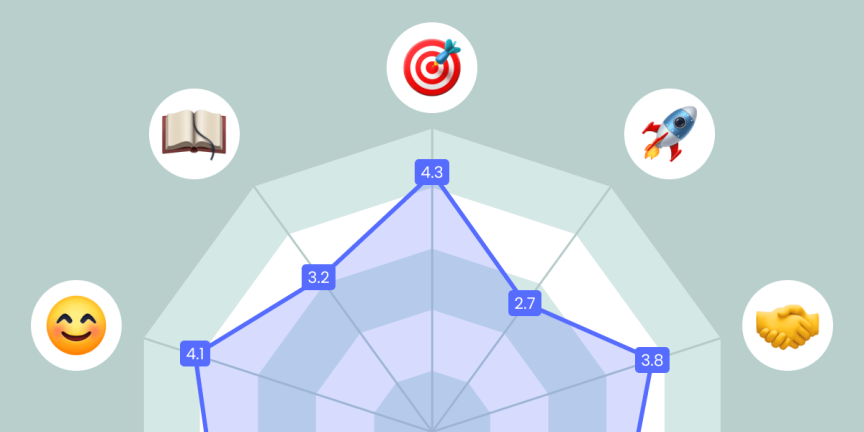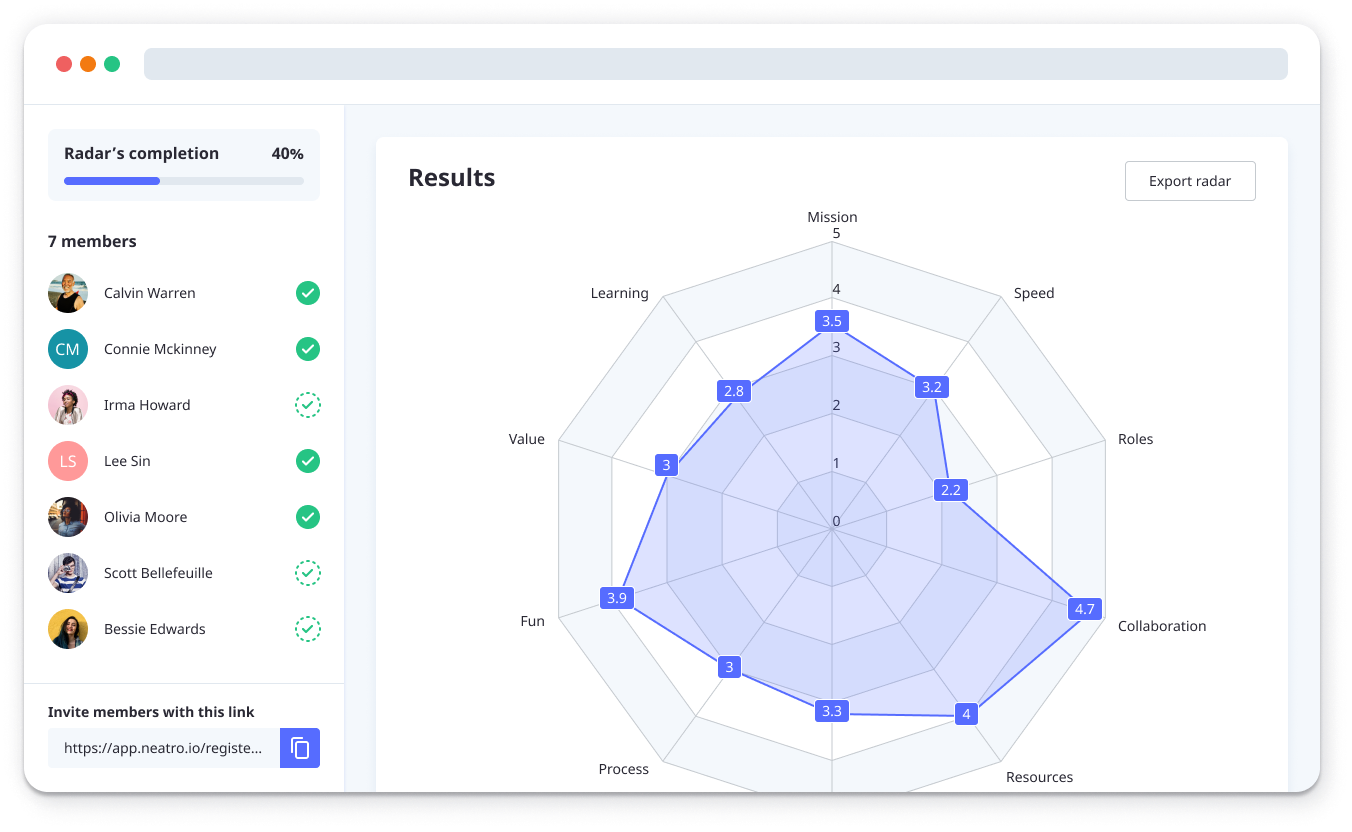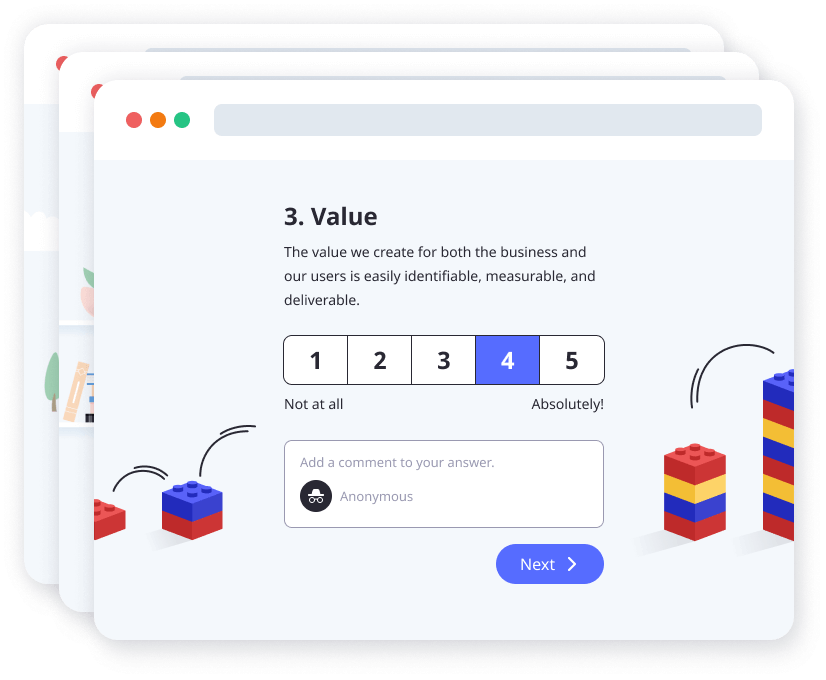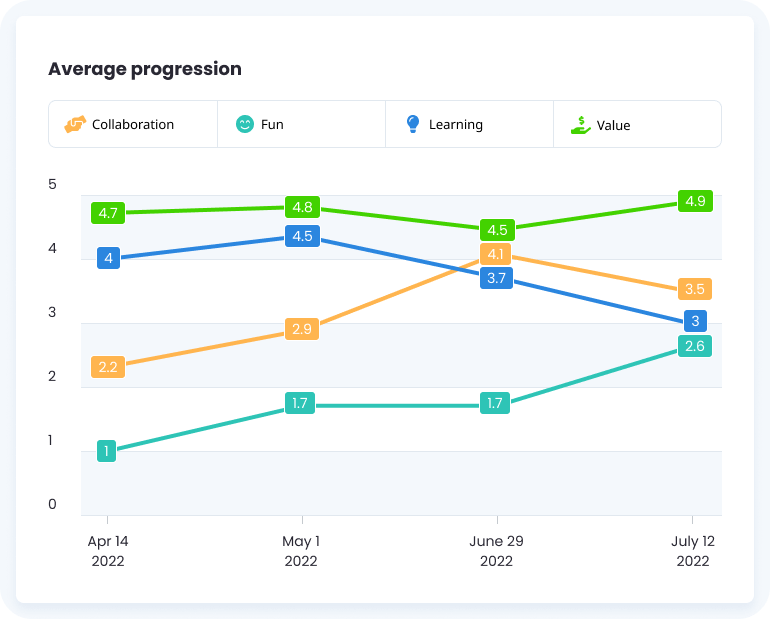The Team Radar Retrospective: A live Health Check


I realized that doing the same retrospective meeting every two weeks had an effect on my Scrum Team: they got bored.
So I started to change the template, I went from Start Stop Continue to 4Ls, to Glad Sad Mad and I even did the Genie in a Bottle retro.
But in the end... the template doesn’t really matter. I still have the feeling of doing the same thing over and over. We discuss what is going well, what is not going well, and what could be improved.
Not only does this set up a certain routine, but in the long run, you will miss something super important to find the focus of your retrospectives: data.
In this article, I'll walk you through how the Team Radar Retrospective can help you break the monotony of your retrospectives and get your team’s pulse.
Why would you do the Team Radar retro?
The team radar allows the team to collect data on different topics. This data will be used to measure and prioritize issues. Then the team will work on these issues in order to improve.
Even if a topic often comes up in retrospectives, that does not mean it is an issue. No matter the topic, the team radar will answer the following question: “Is this really a problem for the whole team?”.
After a team radar, your team will be aware of:
Its main challenges
The distribution of the priorities
The focus of the next retrospectives
The first steps to improve
By repeating this exercise, the team will be able to measure its evolution over time and validate the effectiveness of its action plans.
How to prepare the team radar retrospective?
The team radar is a survey where the team will give a score out of 5 to several themes. These themes are specific to each team and the result will be presented in the shape of a radar.

The preparation is, therefore, more complex than a classic retrospective. The radar needs to evolve with each result while being clear enough to help your team identify the big challenges.
I recommend using a tool that will take care of the logistics, the graphic facilitation, and the survey.
Start by choosing the themes that will make up your team radar. You can either decide them with your team or use an already existing template.
In this article, I will be using Neatro's Team Health Radar. It consists of the following dimensions:
Collaboration
The collaboration is omnipresent and respectful. It manifests itself in constant and high-quality communication.
Fun
Our team atmosphere is enjoyable and pleasant. Each member likes working as a team.
Learnings
Team members keep developing their skills through repeated learning.
Assignment
We are all aligned with the company's goals. Therefore, we know what to do as a team to achieve our objectives and deliver value.
Ownership
Our team works autonomously and can make decisions on its own. Our ownership is easily identifiable from inside and outside the team.
Process
Our processes are rightfully designed and help us deliver value. We do not feel slowed down or blocked because of them.
Resources
We have access to all the material resources and support we need to accomplish our mission.
Roles
The roles and responsibilities of each team member are clear to everyone. All the skills necessary for the success of the team are present.
Speed
We can deliver quality value while respecting delivery dates. The team is working at a healthy and maintainable pace.
Value
The value we create for both the business and our users is easily identifiable, measurable, and deliverable.
How to facilitate the team radar retrospective?
Your radar is ready, it's time to launch the retrospective!
Start by explaining the purpose and principle of the Team Radar Retrospective. This is an exercise where the team will be able to compare their vision on different themes, then learn and improve.
Before we get into the nitty-gritty, I recommend using an Icebreaker to create a relaxed atmosphere and make it easier for the team to share. There are very simple ways to break the ice like the Question Game or 2 Truths 1 Lie.

Then, introduce the radar to the team. You can go over each theme and give more context. I like to ask the team for examples to illustrate the different dimensions of radar. This allows them to align on abstract themes like ‘transparency’ or ‘courage’.
You can now let the team complete the survey. With Neatro, a link is enough to invite your team to respond. This survey can be made completely anonymous if you believe your team's psychological safety is an issue.
Team members will then rate each dimension of the radar from 1 to 5 and you will see the results appear in real-time on your team radar report.

Once everyone has responded, start the discussion by asking the team to make general observations about the results.
You can ask questions like:
Which dimensions were the most complicated to assess?
Are there things that surprise you in the results?
What are our biggest challenges? What does it mean?
The discussions are over, it is time to establish an action plan. Determine, as a team, the two or three dimensions with the highest priority (generally those with the lowest scores).
For each dimension, try to find at least one possible action that could improve things. I recommend that you follow the principle of SMART goals.
Track the evolution of your team's radars
One of the main advantages of the team radar is being able to track the evolution of your team over time.

A tool like Neatro gives you a statistical view of each theme used in a team radar. This allows you to identify trends and use that data to set the focus for your upcoming team retrospectives. It is also a good way to validate if your action plans are having an impact.
Generally, I do not use the team radar with new Scrum teams because I do not yet know their level of psychological safety. I recommend waiting at least 2-3 sprints before doing your first Team Radar. Then do it regularly to follow the evolution of your team.
Of course, nothing forces you to redo the same team radar regularly. This exercise is also an excellent way to decide the focus of your next retrospective.
And there you have it, you now have a simple and effective tool to break the routine of your retrospectives, help your team identify its major issues, and track its evolution over time.
Feel free to try Neatro (it's free!) for your next Team Radar retrospective.
Happy retro! :)



